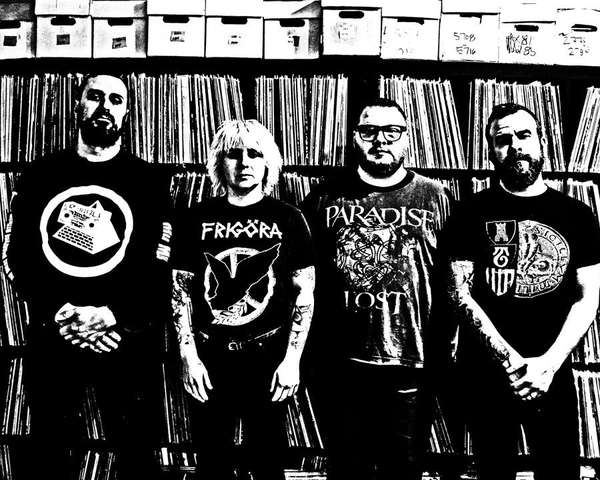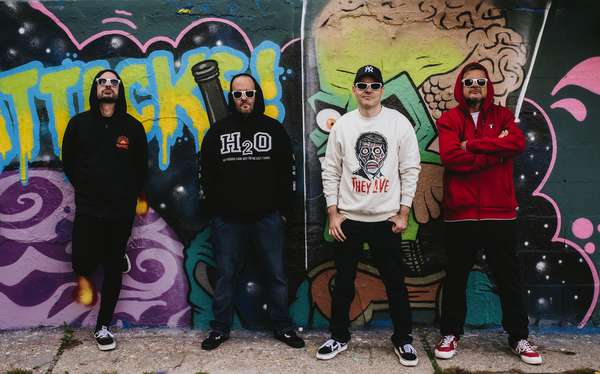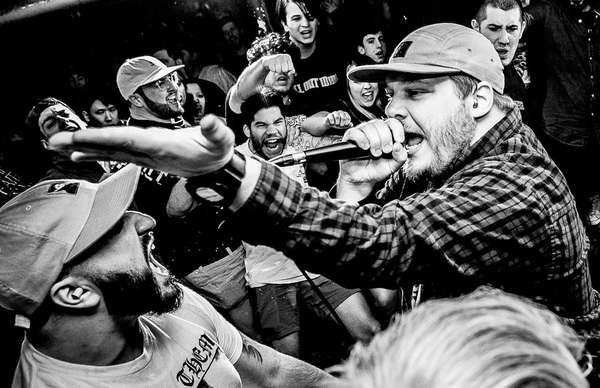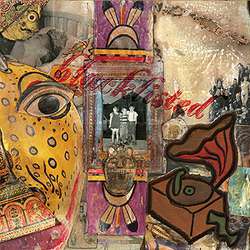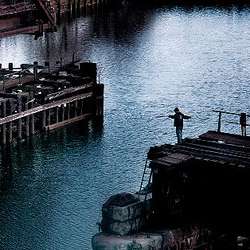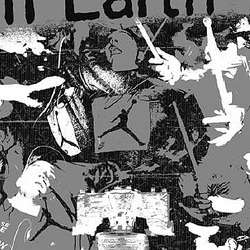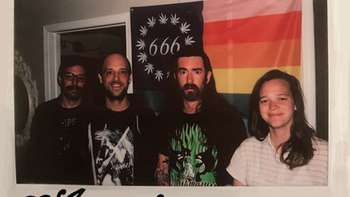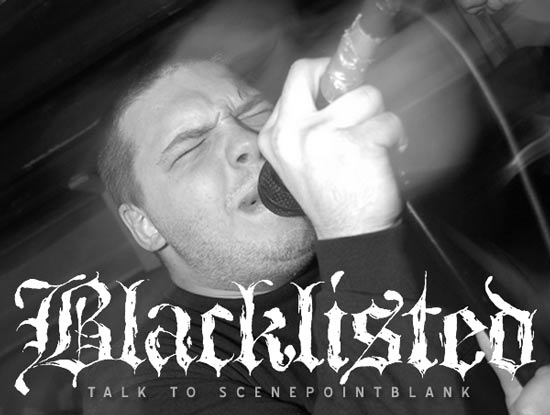
Blacklisted is a name that has become synonymous with present day hardcore. Don't let this association lead you to the belief that Blacklisted is just another hardcore band going through the motions. The band's willingness to experiment with different sounds and vocalist George Hirsch's personal lyrical revelations has put the band in a class all their own. Scene Point Blank recently corresponded with Hirsch about the band's almost breakup, where the band draws inspiration from, and the band's latest long-player, Heavier than Heaven, Lonelier than God.
Scene Point Blank: Start with the basics. Tell us your name and your role in Blacklisted?
George Hirsch: I am George and I project my voice in Blacklisted.
Scene Point Blank: In between the last full-length and this one Blacklisted dealt with a near breakup and lost a key member of the songwriting team. How did this affect the direction of the music? Do you feel that the final product of Heavier than Heaven, Lonelier than God would have been the same had the events not transpired? If so, why? If not, how do you feel they differ?
George Hirsch: Our sound's direction has only ever been affected by one thing and that is the growth both personally and musicianship-wise of the individuals within the band. When members decided to leave those of us left behind never had it in our heads that, "Ok, now is the time to really experiment." We've always wanted to do new things musically. But also when we wrote "The Beat Goes On..." our main driving force behind it was to write a record that would keep us on the road. Whatever would keep us out there still touring is what we were going to do. We were naive to everything accept getting in the van and getting on stage and playing live; we may have paid for it but I do not regret it one bit. It was an amazing time to be in Blacklisted despite whatever reviews and flack we got or whatever peoples' feelings were/are on that record. When we talked about writing both "Peace On Earth" and "Heavier Than Heaven" we grew a lot as people. We toured all over at that point, we gave ourselves a little time to relax, breathe and really try to transfer the sounds in our heads to the sounds you hear on the album. We have never really gone for a "specific" sound, so I can't say that members leaving have really affected our sound. I've just personally been lucky enough to have members quit and people like Bean, Shawn, and Dave fall into place and really get ourselves all together and create music with the type of urgency that I feel we have created it with.
Scene Point Blank: The band chose to re-record two songs from the Peace on Earth, War on Stage 7" for the new album? Why the decision to re-record and include them?
George Hirsch: Well we have been playing those two songs for the last year or so and had added a few minor changes. Also in mind was the fact that those songs had only been on a 7" that has sold about 3,500 copies, We figured we had been playing them a little different and wanted to get them out on a "bigger" scale. I guess essentially you could say we believed in those songs and thought that they belonged on this record. Sonically they fit, as they were the last two songs we wrote on "Peace On Earth..." and not too long after that we started throwing around musical ideas for "Heavier Than Heaven..."
Scene Point Blank: The Layne in "Memory Layne" is a nod to the late Alice in Chains front man, "Heavier than Heaven" was the name of Nirvana's first European tour, and "Lonelier than God" is a reference to a lyric in a Hum song. What role do grunge and alternative rock play in Blacklisted?
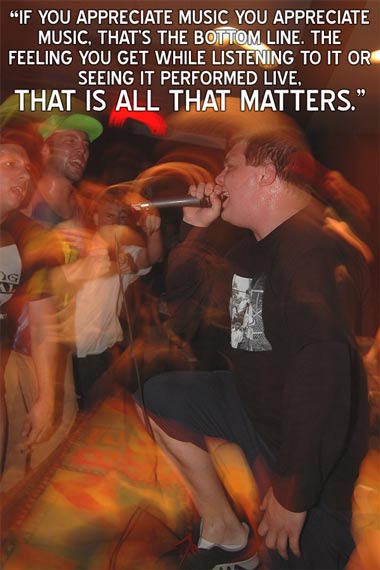 George Hirsch: Actually the "Layne" in "Memory Layne" is in reference to someone from my past/personal life, not Layne Staley. However the second half of the question is correct. I would say that grunge/alternative rock both have played an extremely active role in all of the members of Blacklisted's lives. We all grew up through the 90's so with that naturally comes that type of influence.
George Hirsch: Actually the "Layne" in "Memory Layne" is in reference to someone from my past/personal life, not Layne Staley. However the second half of the question is correct. I would say that grunge/alternative rock both have played an extremely active role in all of the members of Blacklisted's lives. We all grew up through the 90's so with that naturally comes that type of influence.
Scene Point Blank: Hardcore has this tendency to fall into very simple categories: self-empowerment songs, social issue songs, songs about friendship (and backstabbing), etc? Judging by "Matrimony" and the rest of the tracks on Heavier than Heaven, Lonelier than God, it sounds like you're really getting at the subtexts of life, the everyday things that affect each one of our lives. Why this drift to intensely personal lyricism?
George Hirsch: I have this constant feeling that there is something inside of me and it just needs to get out; that is the simplest way I could put it. I can only write about what I know and that's what I do. I write about the things about myself that I hate or that make me feel uncomfortable and crazy, things that I feel affect me and need to be addressed even if its just to myself, like a million post it notes to myself to let me know that everything is alright and I am going to be okay. Hopefully after I resolve it inside my head for myself, others can read the lyrics and listen to the record and get that same feeling or maybe find some comfort in knowing they are not completely alone.
Scene Point Blank: On that note, the Blacklisted blog reads like a diary or a VH-1 Behind The Music. Why give that much to fans? Why not let the music speak for itself?
George Hirsch: I just wanted to blur the line between artist and fan. I'm a hardcore kid, the people who are into my band and the music I/we make are hardcore kids, there is no fan or untouchable demigod status for the musician. I wanted it to be a place where I could write about Blacklisted or whatever I wanted to and have people be able to talk about it or give their opinion. But at the same time I didn't want it to be like the hundreds of messageboards where anyone can just hide behind some computer identity and say whatever they want and never contribute anything positive to this music ever but still gain some "cool/hip" rep within the hardcore scene because they are so and so from the so and so board. I wanted to be in control of it. For me there is no hiding behind the computer with it. Anyone reading is fully aware it is my blog and if they want to discuss it, protest it etc, all they have to do is look into Blacklisted's current tour dates and come to one of our shows and talk about it or message me on there. There is no anonymity and I think that is something hardcore really needs, people need to stand up and have a face and a heart not just ten fingers that can type faster then they can actually think.
Scene Point Blank: By reading your blog it's clear you're an extremely well read and articulate fellow. Do you think hardcore gets a rep of being lowbrow culture because of the aggression associated with it?
George Hirsch: Naturally my answer would be yes. Anything associated with aggression is almost always automatically labeled as "macho," "jockish," etc. It's sad. In my opinion hardcore is defined by that aggression and volatility. I do not condone unnecessary acts of violence, but I would have to say that hardcore for me stands out musically at its most violent, its most unpredictable. You want something that you can feel and lets you know that you are there. When you are in a room with four-hundred kids and people are just diving off of everything and sweating and screaming every word, that intensity is what hardcore is about for me. So honestly anyone that writes hardcore off as "lowbrow" because of that just doesn't understand it and honestly shouldn't even be checking the music out anyway, At least the music I am a part of. For people like that there is always the cute stuff they can listen to on the radio. If they still have an interest in hardcore they can always go get a crew cut and listen to The First Step.
Scene Point Blank: With the blog and the lyrics to Blacklisted, it seems as though you write a lot. Wes Eisold released a collection of writings last year. Ronen Kauffman released a book as well, more of a documentary than a journal. Do you have any plans of releasing such a collection? Or do you feel some writings are just too personal to share?
George Hirsch: I hate writing. I had an interest in it at one time but just gravitated away from it eventually. I write Blacklisted lyrics when there is music written, I never sit down and come up with ideas otherwise. The blog we do, I sit at my computer and just write; that is what comes out natural. I would maybe think about doing something if it was with the right people. But otherwise probably not, I'd rather tour and play as many shows as I can.
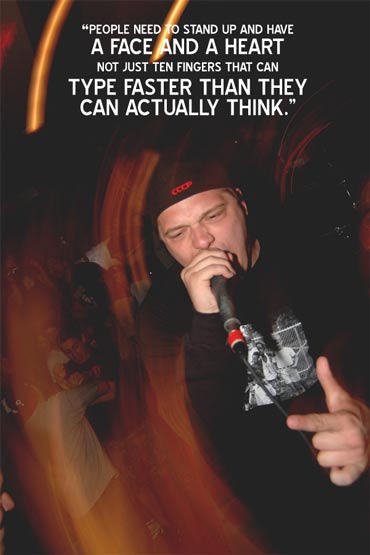 Scene Point Blank: Blacklisted nearly broke up in 2006. Obviously this was a major event not just in the band's life but yours as well. How was this reflected in the music and lyrics of the new album? Did the events of the near breakup change your outlook on life at all?
Scene Point Blank: Blacklisted nearly broke up in 2006. Obviously this was a major event not just in the band's life but yours as well. How was this reflected in the music and lyrics of the new album? Did the events of the near breakup change your outlook on life at all?